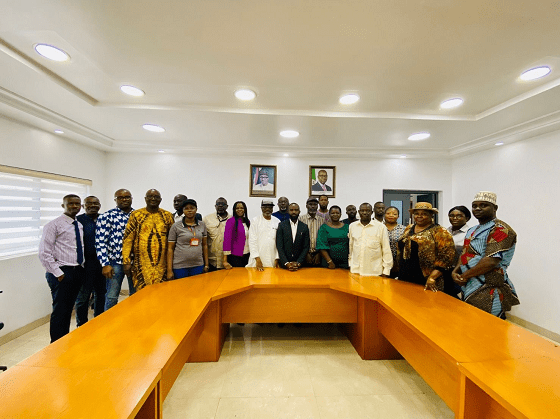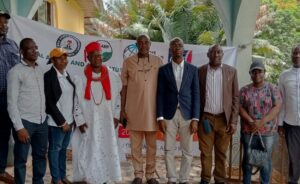In a resolute effort to promote sustainable practices in the production of tree and food crop commodities, the Government of Edo State, led by Governor Godwin Obaseki, has reaffirmed Edo State’s unwavering commitment to fostering environmental consciousness and responsible practices in the tree and food crop sectors. During the transition ceremony from the Africa Palm Oil Initiative (APOI) to the Africa Sustainable Commodity Initiative (ASCI) held in Benin City, Edo State, Nigeria, Mr Churchill Oboh, the Facilitator of the Edo State Africa Sustainable Commodity Initiative (ASCI) and Acting Team Lead of the Edo State Oil Palm Programme (ESOPP), highlighted this development.
Mr Oboh emphasized the significance of this transition, noting that the Edo State Government signed the Marrakesh declaration in 2018, making it the only sub-national entity to join nine other countries in Morocco. As a result, Edo State became a partner of the Tropical Forest Alliance and established the APOI Platform to promote sustainability in oil palm development and forest management within the state.
The ESOPP Team Lead further stated, “After successfully promoting sustainability in oil palm production and forest protection over the past five years, we have realized that the landscape does not solely consist of oil palm but also includes other commodities that drive deforestation. We have come together to identify these commodities and ensure their sustainability.”
Detailing the progress of the Edo State APOI, now ASCI platform, he said, “In collaboration with stakeholders from the 10 West and Central African countries, we have identified food crops and tree crops as drivers of deforestation, and we have been working towards their sustainability. The draft declaration was reviewed during the APOI regional conference in June 2022 in Abidjan, Cote d’Ivoire. Consequently, on November 9, 2022, the Honorable Minister of Environment, Hon. Abubhullahi Mohammed, signed the ASCI declaration on behalf of the country, leading to the transition from APOI to ASCI, which now encompasses other commodities besides oil palm.”
Alhaji Fattai Afolabi, the Managing Director of Foremost Developmental Services, expressed his delight at the transition, stating, “Oil palm is not the sole culprit of deforestation; other crops are also involved. In fact, arable crop production may devastate the forest more than oil palm. Major crops produced in Edo State and other parts of the country, such as plantain, maize, cassava, and others, have significant impacts. It is commendable that we are now including these crops and focusing on them. The outcome will undoubtedly be more favourable.”
Similarly, Mr Igbinosun Idowu Peter, the National President of the National Rubber Producers, Processors, and Marketers Association of Nigeria (NARPPMAN), applauded the platform’s efforts, emphasizing that this inclusive approach is a step in the right direction for Edo State and the country as a whole. He stated, “With the federal government’s focus on developing the non-oil sector, it is crucial to address more than just oil palm. Today’s development is comprehensive and will have a positive multiplier effect on all sectors, particularly the non-oil sector.”
During the event, Mr Billy Ghansah, the representative of Okumu Nigeria Limited, stressed the need to address other varieties of commodities as drivers of deforestation, asserting that including these commodities would pave the way for improved sustainable forest management.
The meeting’s highlight was the review of the Principles and Actions developed during the APOI phase in 2018, now expanded to encompass commodities of interest in Edo State, Nigeria.






